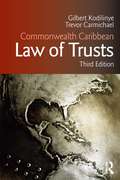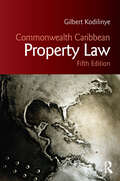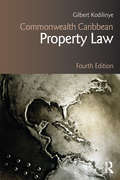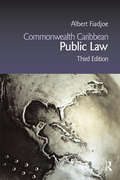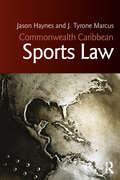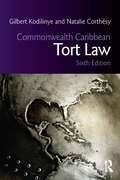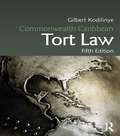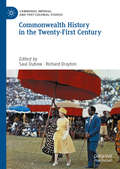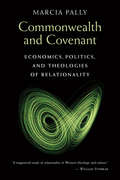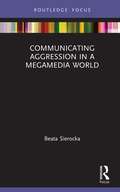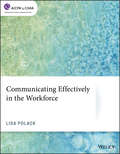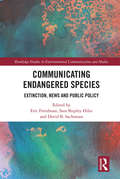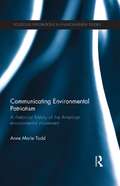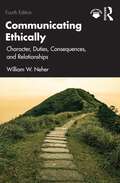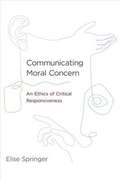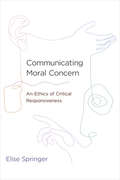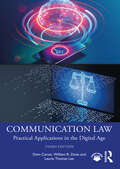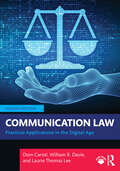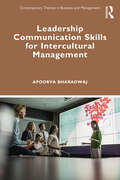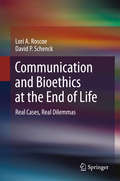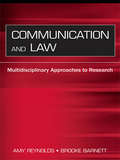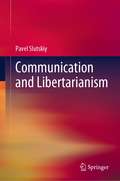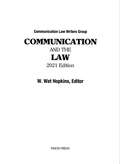- Table View
- List View
Commonwealth Caribbean Law of Trusts: Third Edition (Commonwealth Caribbean Law)
by Gilbert Kodilinye Trevor CarmichaelThe law of trusts is a subject of considerable importance in the Commonwealth Caribbean. Traditional areas, such as testamentary trusts, resulting and constructive trusts, and charitable trusts, are now fully incorporated into the mainstream substantive law of the region, while the principles associated with offshore trust regimes are constantly expanding and developing. This book has been updated to reflect new case law and legislation, and to highlight recent trends relating to both traditional and offshore trusts.
Commonwealth Caribbean Property Law (Commonwealth Caribbean Law)
by Gilbert KodilinyeThis 5th edition of Commonwealth Caribbean Property Law sets out clearly and concisely the central principles of the law of real property in the region, guiding students through this core but often complex subject area. Fully revised and updated to include important new case law from the various Caribbean jurisdictions, the book provides comprehensive coverage of the key topics studied by undergraduates, including co-ownership, leaseholds, condominium, restrictive covenants, easements, mortgages and adverse possession. Emphasis is on those areas that are most commonly litigated in the region, and the book contains discussion of, or reference to, many unreported cases. This new edition features expanded coverage of freehold estates, a glossary of key terms, and a new question and answer section at the end of the book. Commonwealth Caribbean Property Law is essential reading for LLB students in Caribbean universities and students on CAPE Law courses and, with its analysis of the substantive laws across several jurisdictions, it will continue to be an invaluable reference tool for legal practitioners in the region.
Commonwealth Caribbean Property Law (Commonwealth Caribbean Law)
by Gilbert KodilinyeProperty law is concerned with a wider variety of rights, obligations and interests than most other areas of law, and can prove daunting to those studying the subject for the first time. Commonwealth Caribbean Property Law sets out in a clear and concise manner the central principles of the law of real property in the region, in order to guide students through this often complex core subject area. In this new edition, the book has been fully revised and updated to include important new case law from the various Caribbean jurisdictions and an expanded appendix of working documents. With comprehensive coverage of the main topics studied by undergraduates, such as Leases, Co-Ownership, Restrictive Covenants, Easements, Mortgages, and Land Sale, this textbook is essential reading for LLB students in Caribbean universities and students on CAPE Law courses. The extensive coverage of land law from a Caribbean perspective and analysis of the substantive laws of several jurisdictions will also make this text an invaluable reference tool for practitioners.
Commonwealth Caribbean Public Law
by Albert FiadjoeTaking a critical look at the major areas of constitutional and administrative law, Commonwealth Caribbean Public Law places a firm emphasis on the protection of citizens' rights and good governance. The third edition of this book builds on the success of the previous two editions, setting-out the established legal principles through Caribbean cases, along with critique and commentary of the law where appropriate. Contemporary issues and changes in Caribbean public law are addressed including: the refining of the rules governing judicial review; recent cases dealing with the death penalty; and the likely impact on CARICOM initiatives on the rights of citizens.
Commonwealth Caribbean Sports Law (Commonwealth Caribbean Law)
by Jason Haynes J. Tyrone MarcusSports Law has quickly developed into an accepted area of academic study and practice in the legal profession globally. In Europe and North America, Sports Law has been very much a part of the legal landscape for about four decades, while in more recent times, it has blossomed in other geographic regions, including the Commonwealth Caribbean. This book recognizes the rapid evolution of Sports Law and seeks to embrace its relevance to the region. This book offers guidance, instruction and legal perspectives to students, athletes, those responsible for the administration of sport, the adjudication of sports-related disputes and the representation of athletes in the Caribbean. It addresses numerous important themes from a doctrinal, socio-legal and comparative perspective, including sports governance, sports contracts, intellectual property rights and doping in sport, among other thought-provoking issues which touch and concern sport in the Commonwealth Caribbean. As part of the well-established Routledge Commonwealth Caribbean Law Series, this book adds to the Caribbean-centric jurisprudence that has been a welcome development across the region. With this new book, the authors assimilate the applicable case law and legislation into one location in order to facilitate an easier consumption of the legal scholarship in this increasingly important area of law.
Commonwealth Caribbean Tort Law (Commonwealth Caribbean Law)
by Gilbert Kodilinye Natalie CorthesyCommonwealth Caribbean Tort Law is well established as the leading text on tort law in the Caribbean jurisdictions, now updated in its sixth edition. This new edition sees the addition of co-author Dr Natalie Corthésy. It introduces a brand-new chapter on the nature of personality rights, with a strong focus on passing off and suggested solutions to redress the issues. All chapters have been updated to reflect ever-changing developments in jurisprudence, legislation and legal thinking, including revisions of the special contribution on the misuse of private information by Dr Vanessa Kodilinye. Commonwealth Caribbean Tort Law is ideally suited for LLB courses in Caribbean universities and law students studying modules on Caribbean Law, as well as students undertaking the CAPE Law examinations. Legal practitioners, business executives and industrialists working on the legal aspects of these areas will also find this book useful.
Commonwealth Caribbean Tort Law (Commonwealth Caribbean Law)
by Gilbert KodilinyeTort law is a subject of primary importance in the study and practice of the common law in Caribbean jurisdictions. This work is now well established as the leading text on tort law in the region, and this fifth edition has been updated throughout to incorporate developments in law and legal thinking, including special contributions on medical negligence and the misuse of private information from the Hon Justice Roy Anderson and Dr Vanessa Kodilinye. The accessible writing style and integration of up-to-date material enables students to grasp the salient points and develop a thorough understanding of Tort Law in the Caribbean. Although conceived primarily as a text for the LLB degree courses in Caribbean universities, Commonwealth Caribbean Tort Law is also essential reading for students preparing for the CAPE Law examinations and the various paralegal courses in the region. Legal practitioners will find the book useful as a work of ready reference, and it will also be of interest to those business executives, industrialists, insurance agents and journalists who require some knowledge of this most important area of the law.
Commonwealth History in the Twenty-First Century (Cambridge Imperial and Post-Colonial Studies Series)
by Saul Dubow Richard DraytonThis edited collection draws together new historical writing on the Commonwealth. It features the work of younger scholars, as well as established academics, and highlights themes such as law and sovereignty, republicanism and the monarchy, French engagement with the Commonwealth, the anti-apartheid struggle, race and immigration, memory and commemoration, and banking. The volume focusses less on the Commonwealth as an institution than on the relevance and meaning of the Commonwealth to its member countries and peoples. By adopting oblique, de-centred, approaches to Commonwealth history, unusual or overlooked connections are brought to the fore while old problems are looked at from fresh vantage points – be this turning points like the relationship between ‘old’ and `new’ Commonwealth members from 1949, or the distinctive roles of major figures like Jawaharlal Nehru or Jan Smuts. The volume thereby aims to refresh interest in Commonwealth history as a field of comparative international history.
Commonwealth and Covenant: Economics, Politics, and Theologies of Relationality
by Marcia PallyIn Commonwealth and Covenant Marcia Pally argues that in order to address current socioeconomic problems, we need not more economic formulas but rather a better understanding of how the world is set up — an ontology of how we and the world work. Without this, good proposals that arise lack political will and go unimplemented. Pally describes our basic setup as “separability-amid-situatedness” or “distinction-amid-relation.” Though we are all unique individuals, we become our singular selves through our relations and responsibilities to the people and environments around us. Pally argues that our culture’s overemphasis on “separability” — individualism run amok — results in greed, adversarial and deceitful political discourse and chicanery, resource grabbing, broken relationships, and anomie. Maintaining that separability and situatedness can and must be considered together in public policy, Pally draws on intellectual history, philosophy, and — especially — historic Christian and Jewish theologies of relationality to construct a new framework for addressing present economic and political ills.
Commonwealth and Covenant: Economics, Politics, and Theologies of Relationality
by Marcia PallyIn Commonwealth and Covenant Marcia Pally argues that in order to address current socioeconomic problems, we need not more economic formulas but rather a better understanding of how the world is set up — an ontology of how we and the world work. Without this, good proposals that arise lack political will and go unimplemented. Pally describes our basic setup as &“separability-amid-situatedness&” or &“distinction-amid-relation.&” Though we are all unique individuals, we become our singular selves through our relations and responsibilities to the people and environments around us. Pally argues that our culture&’s overemphasis on &“separability&” — individualism run amok — results in greed, adversarial and deceitful political discourse and chicanery, resource grabbing, broken relationships, and anomie. Maintaining that separability and situatedness can and must be considered together in public policy, Pally draws on intellectual history, philosophy, and — especially — historic Christian and Jewish theologies of relationality to construct a new framework for addressing present economic and political ills.
Commonwealth of Massachusetts Driver's Manual: Passenger Vehicles
by Massachusetts Registry of Motor VehiclesFor new drivers, this booklet is a useful tool for understanding the licensing process and for studying the rules of the road. For experienced drivers, this booklet offers more than the procedure for obtaining a learner’s permit. It provides valuable information on RMV policies, changes to driving laws, and safe driving tips.
Communicating Aggression in a Megamedia World (Routledge Focus on Communication Studies)
by Beata SierockaThis book describes how, in the era of megamedia culture, aggression in communication constitutes a threat to the communication community. Based on the theoretical incorporation of transcendental pragmatics, the book explores how conceptualizing the phenomena of megamedia aggression from this perspective and diagnosing their destructive force are essential for: postulating the need for constructing a theory of media communication closely related to the model of discursive rationality, giving this theory a critical and normative character, and embedding it in the perspective of the project of social co-responsibility and in the plan for an ethics of co-responsibility. Combining key elements of media theory, the philosophy of communication, the concept of normative ethics and the fields of social psychology and social anthropology, this book will be of great interest to scholars and students in the areas of communication studies, philosophy, anthropology, psychology and psychoanalysis.
Communicating Effectively in the Workforce (AICPA)
by Lisa PolackIf you do not understand how communication works, then you may become perplexed and frustrated by interactions in the workplace. However, if you understand how communication works, then you have a good chance of diagnosing and fixing communication problems. Best of all, you can influence and motivate your employees, make better decisions, negotiate more effectively, build better work teams, and accomplish business objectives. This book discusses the various forms of communication.
Communicating Endangered Species: Extinction, News and Public Policy (Routledge Studies in Environmental Communication and Media)
by Eric Freedman; Sara Shipley Hiles; David B. SachsmanCommunicating Endangered Species: Extinction, News, and Public Policy is a multidisciplinary environmental communication book that takes a distinctive approach by connecting how media and culture depict and explain endangered species with how policymakers and natural resource managers can or do respond to these challenges in practical terms. Extinction isn’t new. However, the pace of extinction is accelerating globally. The International Union for Conservation of Nature classifies more than 26,000 species as threatened. The causes are many, including climate change, overdevelopment, human exploitation, disease, overhunting, habitat destruction, and predators. The willingness and the ability of ordinary people, governments, scientists, nongovernmental organizations, and businesses to slow this deeply disturbing acceleration are uncertain. Meanwhile, researchers around the world are laboring to better understand and communicate the possibility and implications of extinctions and to discover effective tools and public policies to combat the threats to species survival. This book presents a history of news coverage of endangered species around the world, examining how and why journalists and other communicators wrote what they did, how attitudes have changed, and why they have changed. It draws on the latest research by chapter authors who are a mix of social scientists, communication experts, and natural scientists. Each chapter includes a mass media and/or cultural aspect. This book will be essential reading for students, natural resource managers, government officials, environmental activists, and academics interested in conservation and biodiversity, environmental communication and journalism, and public policy.
Communicating Environmental Patriotism: A Rhetorical History of the American Environmental Movement (Routledge Explorations in Environmental Studies)
by Anne Marie ToddEnvironmental patriotism, the belief that the national environment defines a country’s greatness, is a significant strand in twentieth century American environmentalism. This book is the first to explore the history of environmental patriotism in America through the intriguing stories of environmental patriots and the rhetoric of their speeches and propaganda, The See America First movement began in 1906 with the aim of protecting and promoting the landscapes of the American West. In 1908, Gifford Pinchot and President Theodore Roosevelt hosted the White House Conservation Conference to promote the wise use of natural resources for generations of Americans. In 1912, Pittsburgh’s smoke investigation condemned the effects of coal smoke on the city’s environment. In World War II, a massive propaganda effort mobilized millions of Americans to plant victory gardens to save resources for the war abroad. While these may not seem like crucial moments for the American environmental movement, this new history of American environmentalism shows that they are linked by patriotism. The book offers a provoking critique of environmentalists’ communication strategies and suggests patriotism as a persuasive hook for new ways to make environmental issues a national priority. This original research should be of interest to scholars of environmental communication, environmental history, American history and environmental philosophy.
Communicating Ethically: Character, Duties, Consequences, and Relationships
by William W. NeherThis thoroughly updated fourth edition provides a broad introduction to the major theoretical perspectives on the ethics of communication. It brings together classical and modern theories of ethical philosophy to address issues at play in specific careers and domains throughout the field. By incorporating a simple framework for ethical reasoning, readers are able to develop their own understanding of various criteria for making ethical judgments. The book applies ethical theories, such as virtue and dialogical ethics, to interpersonal, organizational, political, social media, and digital communication contexts. This edition contains expanded coverage of contemporary and non-Western issues and theories. This includes the Black Lives Matter and #MeToo movements, "fake news", new technologies such as "Deepfake" videos, Confucian ethics, and Igbo ethics. It also includes a new chapter on the ethics of communicating scientific and medical risks. This book serves as a core textbook for undergraduate courses in Communication and Media Ethics and can also be used as a supplemental resource for field-specific courses in Strategic Communication, Interpersonal Communication, and Public Relations. Online resources for instructors include sample syllabi, sample assignments, and a test bank for multiple choice and essay questions. They are available at www.routledge.com/9781032507798.
Communicating Moral Concern
by Elise SpringerModern moral theories have crystallized around the logic of individual choices,abstracted from social and historical context. Yet most action, including moral theorizing, canequally be understood as a response, conscious or otherwise, to the social world out of which itemerges. In this novel account of moral agency, Elise Springer accords central importance to how weintervene in activity around us. To notice and address what others are doing with their moral agencyis to exercise what Springer calls critical responsiveness. Her account of this responsivenesssteers critics away from both of the conventionally familiar ideals -- justifying and expressingreactive attitudes on one hand, and prescribing and manipulating behavioral outcomes on the other. Good critical practice functions instead as a dynamic gestural engagement of attention, reachingfurther than expressive representation but not as far as causal control. To make sense of suchengagement, Springer unravels the influence of several entrenched philosophical dichotomies (activevs. passive, representation vs. object, illocution vs. perlocution). Where previous accounts havebeen preoccupied with justified claims or with end results, Springer urges the cultivation ofsituated critical engagement -- an unorthodox virtue. Moral agency can thereby claim a creative andembodied aspect, transforming the world of action through a socially extended process ofcommunicating concern.
Communicating Moral Concern: An Ethics of Critical Responsiveness
by Elise SpringerA novel reframing of moral agency, emphasizing the responsive habits and skills by which we engage one another's attention to moral concerns.Modern moral theories have crystallized around the logic of individual choices, abstracted from social and historical context. Yet most action, including moral theorizing, can equally be understood as a response, conscious or otherwise, to the social world out of which it emerges. In this novel account of moral agency, Elise Springer accords central importance to how we intervene in activity around us. To notice and address what others are doing with their moral agency is to exercise what Springer calls critical responsiveness. Her account of this responsiveness steers critics away from both of the conventionally familiar ideals—justifying and expressing reactive attitudes on one hand, and prescribing and manipulating behavioral outcomes on the other. Good critical practice functions instead as a dynamic gestural engagement of attention, reaching further than expressive representation but not as far as causal control.To make sense of such engagement, Springer unravels the influence of several entrenched philosophical dichotomies (active vs. passive, representation vs. object, illocution vs. perlocution). Where previous accounts have been preoccupied with justified claims or with end results, Springer urges the cultivation of situated critical engagement—an unorthodox virtue. Moral agency can thereby claim a creative and embodied aspect, transforming the world of action through a socially extended process of communicating concern.
Communication Law: Practical Applications in the Digital Age
by William R Davie Dom Caristi Laurie Thomas LeeThis fully revised third edition brings a fresh approach to the fundamentals of mass media and communication law in a presentation that undergraduate students find engaging and accessible. Designed for students of communication that are new to law, this volume presents key principles and emphasizes the impact of timely, landmark cases on today’s media world, providing an applied learning experience. This new edition offers expanded coverage of digital media law and social media, a wealth of new case studies, expanded discussions of current political, social, and cultural issues, and new features focused on ethical considerations and on international comparative law. Communication Law serves as a core textbook for undergraduate courses in communication and mass media law. Online resources for instructors, including an Instructor’s Manual, Test Bank, and PowerPoint slides, are available at: www.routledge.com/9780367546694
Communication Law: Practical Applications in the Digital Age
by Dom Caristi Laurie Thomas Lee William R. DavieThis fully revised 4th edition brings a fresh approach to the fundamentals of mass media and communication law in an engaging and accessible way, keeping legal jargon to a minimum and highlighting real-life examples of legal conflicts.Designed for students of communication that are new to law, this volume presents key principles and emphasizes the impact of timely, landmark cases on today’s media world. Providing an applied learning experience, this new edition offers expanded coverage of telecommunications, digital media law, and social media. It presents discussions of contemporary political, social, and cultural issues such as artificial intelligence, surveillance, cybersecurity, revenge porn, deepfakes, and disinformation campaigns. To encourage critical thinking, chapters include “From the Trenches” vignettes written by practitioners, “Global View” pieces comparing U.S. status to that in other countries, and “Ethical Dilemmas” ideal for class discussion.Communication Law serves as a core textbook for undergraduate courses in communication and mass media law.Online resources for instructors, including an Instructor’s Manual, Test Bank, PowerPoint slides, and Timelines are available at: www.routledge.com/9781032612980.
Communication Skills for Global Leadership: Strategies for Effective Intercultural Management (Contemporary Themes in Business and Management)
by Apoorva BharadwajIntercultural business communication has assumed enormous significance in recent times for corporate leaders for transmitting and disseminating ideas across borders and for achieving organisational goals. This book provides a comprehensive introduction to communication strategies in business with a focus on diversity management skills.Culturally congruent communication competencies play an essential role in fostering productive conversations in transnational markets. This book includes in-depth research that explores key communication skills like negotiations, leadership, persuasion, argumentation, and corporate etiquette for professionals working in multinational realms of international commerce. It discusses intercultural management theories, non-verbal communications, and effective methods of communicating in virtual environments. The book also highlights the role and importance of diversity management in steering and helming multicultural teams and the expertise needed to manage stressful and challenging communication scenarios in variegated geo-cultural workspaces.Part of the Contemporary Themes in Business and Management series, this book will be useful for scholars and researchers of management studies, business communications, communication studies, business economics, business ethics, and digital communication, as well as for corporate professionals working with multinationals.
Communication and Bioethics at the End of Life: Real Cases, Real Dilemmas
by Lori A. Roscoe David P. SchenckThis casebook provides a set of cases that reveal the current complexity of medical decision-making, ethical reasoning, and communication at the end of life for hospitalized patients and those who care for and about them. End-of-life issues are a controversial part of medical practice and of everyday life. Working through these cases illuminates both the practical and philosophical challenges presented by the moral problems that surface in contemporary end-of-life care. Each case involved real people, with varying goals and constraints,who tried to make the best decisions possible under demanding conditions. Though there were no easy solutions, nor ones that satisfied all stakeholders, there are important lessons to be learned about the ways end-of-life care can continue to improve. This advanced casebook is a must-read for medical and nursing students, students in the allied health professions, health communication scholars, bioethicists, those studying hospital and public administration, as well as for practicing physicians and educators.
Communication and Law: Multidisciplinary Approaches to Research (Routledge Communication Series)
by Amy Reynolds Brooke BarnettCommunication and Law brings together scholars from law and communication to talk both generally and specifically about the theoretical and methodological approaches one can use to study the First Amendment and general communication law issues. The volume is intended to help graduate students and scholars at all skill levels think about new approaches to questions about communication law by offering a survey of the multidisciplinary work that is now available. It is designed to challenge the conventional notion that traditional legal research and social science methodological approaches are mutually exclusive enterprises.This book has been developed for researchers working in mass communication and law and will be appropriate for graduate students and scholars. It will also appeal to those in psychology, political science, and other areas who are interested in exploring questions of law in their research.
Communication and Libertarianism
by Pavel Slutskiy"This is an outstanding contribution to both libertarian political philosophy and communication theory. It is far and away the most comprehensive work on communication issues in libertarian theory ever published. The author has integrated successfully the libertarian insights of Mises, Rothbard, Block, Kinsella and others with the philosophy of language as developed by Austin, Searle and Grice. He has done so in a unique and unprecedented way. The book would appeal to students and scholars interested in libertarian theory and more generally, to philosophers and political scientists interested in high-level scholarship.” - David Gordon, libertarian philosopher and intellectual historian, Ludwig von Mises Institute.
